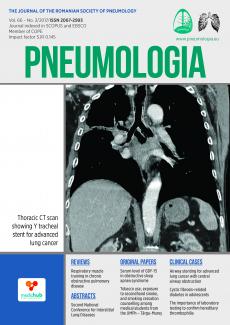Clinical Cases
Long-term survival of a small cell lung cancer patient with proper endobronchial management
Arda Kiani1, Adnan Khosravi1, Ali Sanjari Moghaddam2, Hamidreza Jabbari3, Mohammad Fakhri1,21. Chronic Respiratory Disease Research Center, National Research Institute of Tuberculosis and Lung Disease, Shahid Beheshti University of Medical Sciences, Tehran, Iran, 2. School of Medicine, Shahid Beheshti University of Medical Sciences, Tehran, Iran, 3. Tracheal Diseases Research Center, National Research Institute of Tuberculosis and Lung Disease, ShahidBeheshti University of Medical Sciences, Tehran, Iran
Abstract
Small cell lung cancer (SCLC) is considered as a disease with poor prognosis and early metastasis with a very short survival. Endobronchial involvement is fairly common finding in SCLC and can cause respiratory symptoms. In this report we present a 47-year-old man diagnosed with small cell lung cancer. In the disease course, primary involvement of right bronchus spread to left bronchus and carina. Scheduled sessions of bronchoscopic interventions with electrocautery and argon plasma coagulation were used to maintain his large airways open. The intrabronchial interventions were accompanied by six courses of cisplatin-based chemotherapy as a standard treatment. Although patient's definite diagnosis was extensive SCLC, he remained in a good condition for 5 years. In last year of his follow up, headache and dizziness were added to his occasional respiratory symptoms. Brain MRI identified metastatic lesion in his brain. Hence, brain radiotherapy was suggested, but he refused further aggressive treatment. Seven months later, he died of brain metastatic lesion. Considering long survival of this patient with adequate and proper scheduled endobronchial interventions along with standard courses of chemotherapy, we conclude that this combined treatment strategy in patients with endobronchial involvement might increase survival.
Keywords: small cell lung cancer, endobronchial involvement, interventional bronchoscopy, survival




 Long-term survival of a small cell lung cancer patient with proper endobronchial management
Long-term survival of a small cell lung cancer patient with proper endobronchial management